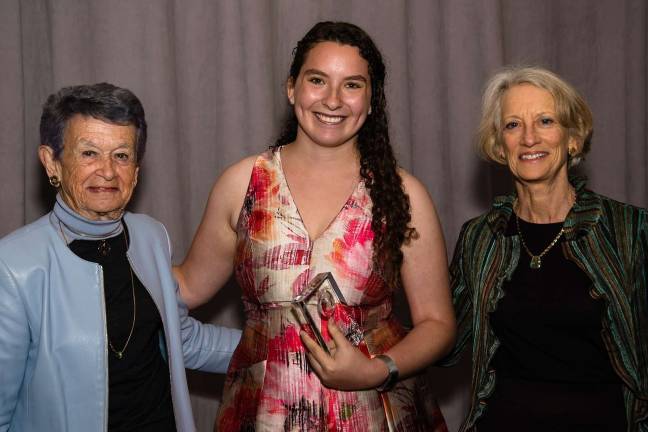UWS teen advocates for girls worldwide

Four years ago, Yardena Gerwin, then 15, was diagnosed with autoimmune encephalitis, which meant her immune system was attacking her brain. But before getting properly diagnosed, Gerwin said a few of her male doctors said the symptoms she was experiencing were psychological and attributable to anxiety or stress.
After two female psychologists examined her and determined there was nothing psychologically wrong, the doctors found something clinical. Gerwin emerged from her medical trials certain that sexism was at work in her doctors’ initial diagnoses, and that made her wonder what it was like for girls in other countries, particularly in developing nations. She took it upon herself to help her peers and empower them.
She was still 15 when she founded a chapter of the international advocacy initiative Girl Up at The Abraham Joshua Heschel School on the Upper West Side. Since then, Gerwin, now 19, climbed the ranks and is now head of the coalition. She’s come to advocate for girls all over the world.
In June, Gerwin was announced as a recipient of the 2018 Diller Teen Tikkun Olam Award, a $36,000 award that recognizes teens for their commitment to social good and volunteer service. She has been recognized for updating and empowering the New York City chapter of the Girl Up campaign.
“A lot of the issues we focus on is child marriage, helping girls get an education, make sure they live a life free from violence and that they have access to health services,” Gerwin said, mentioning work in countries as diverse as Malawi, Guatemala, Liberia and India. “But what is really unique about Girl Up as a whole is that the main core of people advocating for these girls in developing countries, both by fundraising and also by legislation.”
The organization’s main age demographic is 13 to 18. Gerwin’s chapter meets weekly to discuss the issues girls in developing countries faces. They also lobby their national representatives.
They lobbied Congress to pass the Girls Count Act, bipartisan legislation that puts the weight of the United States toward an effort ensuring that children in developing countries are registered at birth. Girl Up is now pushing for the passage of legislation — Protecting Girls in Vulnerable Settings Act — designed to ensure girls in refugee camps get an education, and are in a school on days they’re safe from violence and also able to continue their education.
“It’s really been one of the most gratifying experiences of my life, there’s something really special about watching the moment where it just clicks for a girl and they kind of just realize that they are capable of doing something they really want to do,” Gerwin said. “Oftentimes the only thing stopping them from achieving their goals and believing in themselves, is themselves.”
Now in its 12th year, the Diller Teen Tikkun Olam Awards has given more than $4 million to 114 Jewish teens tackling global issues. The awards were the vision of the philanthropist Helen Diller, the force behind The Helen Diller Family Foundation. Award money can be used for college or to further support causes and efforts the recipient is advocating for.
“Tikkun Olam means repairing the world in Hebrew,” Gerwin said. “That’s a big Jewish concept, that we’re called upon to do our part in the world. I’ve had moments when people say ‘why aren’t you working with Jews or for a Jewish organization?’ I’ve always brought up the concept of Tikkun Olam. It’s not just the responsibility of Jewish people to help other Jewish people, we have the responsibility to repair the entire world.”
Gerwin is about to start her freshman year at American University in Washington, D.C., where she will study in the School of Public Affairs. She said she has high hopes for the Girl Up New York Coalition, even though she’ll be in another state.
She created an executive board and trained two vice presidents to lead the Girl Up New York Coalition.
“I think the future is really bright,” Gerwin said. “We have more connections, we have more resources and we have more girls than we ever have.”